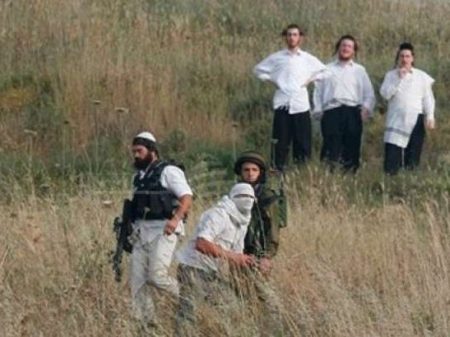Illegal Israeli settlers, Monday, stole the olive harvest of Palestinian farmers in the village of Qaryout, just south of the northern West Bank city of Nablus.
Local sources said that a number of Palestinian farmers entered their olive groves adjacent to the encroaching nearby illegal settlement of Eli, but they were completely shocked to find out that Israeli settlers had stole their harvest and placed iron barriers obstructing Palestinian access to the land.
Meanwhile, settlers flooded sewage into groves belonging to Palestinian farmers in the village of Al-Jab’a, west of Bethlehem.
Mayor of Al-Jab’a, Dhyab Masha’la confirmed that settlers from the illegal settlement of Bat Ayin discharged their sewage on five dunams planted with olive trees in Wadi al-Khanzir area.
The owner of the olive grove was identified as the sons of Mohammad Ibrahim Abu Luha.
Every year, without fail, much of the olive harvest is characterized by attacks on Palestinian farmers and families by Israeli settlers and armed soldiers.
Over the past two weeks, the West Bank has witnessed a wave of settler attacks and agricultural terrorism as Palestinian farmers began the year’s olive harvest.
Attacks were mainly in northern villages near Nablus and Salfit districts, with the largest concentration of illegal Israeli settlements.
Settlers attacked olive harvesters in Burin village, south of Nablus, on 12 October, the same day as a 55-year-old Palestinian farmer was attacked by settlers in the nearby village of Tel. Two days prior, settlers stole olives from trees belonging to farmers in the same area.
Armed settlers attacked farmers in the village Shufa, near the city Tulkarem in the north-western West Bank, who threatened to shoot farmers if they did not leave their land.
The most devastating attack occurred on the morning of 16 October, when more than 30 masked and armed settlers charged at Palestinian farmers and foreign volunteers in Burin, southwest of Nablus City. The illegal colonists attacked three internationals and seriously injuring one, including 80-year-old Rabbi Moshe Yehuda from the Rabbis for Human Rights organization.
With more than 12 million olive trees planted across 45% of the West Bank’s agricultural land, the olive harvest constitutes one of the largest sources of income for thousands of Palestinian families.
According to United Nations Office for the Coordination of Humanitarian Affairs (OCHA), the olive oil industry supports the livelihoods of more than 100,000 families and accounts for 25% of the gross agricultural income of the occupied territories.
As the local Non-Governmental Organization MIFTAH notes, “olive trees carry more than an economic significance in the lives of Palestinians. They are not just like any other trees, they are symbolic of Palestinians’ attachment to their land.”
“Because the trees are drought-resistant and grow under poor soil conditions, they represent Palestinian resistance and resilience. The fact that olive trees live and bear fruit for thousands of years is parallel to Palestinian history and continuity on the land.”
Source: Palestinian News and Info Agency [WAFA]
Edited for IMEMC: Ali Salam

